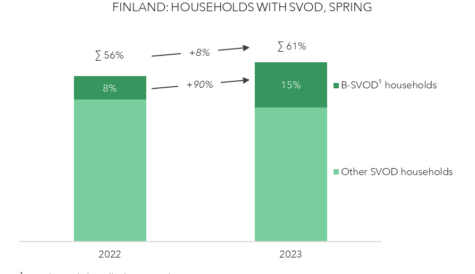
After more than 40 years of operation, DTVE is closing its doors and our website will no longer be updated daily. Thank you for all of your support.
As Salto shuts down, what can European media companies learn?
 After months of uncertainty, France Télévisions, M6 and TF1 finally decided to call it a day on Salto, their streaming JV. Billed as a home-grown French alternative to the US streamers, it simply didn’t have the firepower to compete. In coming weeks, its 800,000+ customers will presumably dissipate in the direction of rival services.
After months of uncertainty, France Télévisions, M6 and TF1 finally decided to call it a day on Salto, their streaming JV. Billed as a home-grown French alternative to the US streamers, it simply didn’t have the firepower to compete. In coming weeks, its 800,000+ customers will presumably dissipate in the direction of rival services.
Nobody in Europe should take any pleasure from Salto’s demise. The fact that three of Europe’s most powerful media organisations couldn’t muster up meaningful opposition to Netflix et all is a concern for creativity and plurality of voices. True, the US players are increasing their local content investment – but their business models will always fundamentally be about amortising expenditure across markets.
So what lessons can European media companies draw from Salto’s collapse and other recent activity on the continent? Well on the face of it there are three themes.
Domestic SVOD is a tough proposition
Salto might have enjoyed more success if it had tempered its ambition slightly. With so many TV subscription services in France, it was always going to be a tough call to get consumers to cough up additional cash for the narrowly-defined service. Perhaps if it had come to market a year later it would have caught the AVOD/FAST wave that is sweeping across the industry. There are, of course, several regional SVOD services – but often they have evolved out of PayTV operations that are already equipped with the content, infrastructure and customer relationships required to compete.
Salto might, perhaps, have been better conceived along the lines or ITVX or Joyn. And it’s possible that the shareholders now realise this. TF1 has been expanded its AVOD activities with MyTF1 and Stream, while M6 is moving more aggressively into FAST. This week, M6 said the total cost of the liquidation of Salto would be €66.0 million, divided between the three shareholders. So maybe we are witnessing a pivot, where future investments in Salto are redirected instead towards AVOD/FAST.
Regulators can’t be relied on to help
As a parting shot, Salto’s shareholders blamed French regulators for not allowing the merger of RTL-owned M6 and TF1 in 2022 – a pooling of resources that might have been enough to push Salto through to a point of sustainability. At one level, it’s true that the merger would have create a very powerful local entity. But it’s also true that M6 and TF1 are dwarfed by the economic power of big tech platforms and Hollywood. Without a relaxation of anti-trust rules in Europe, local players will inevitably see their market impact decline. To its frustration, RTL has seen a similar situation emerge in the Netherlands, where regulators blocked a proposed merger with Talpa. RTL CEO Thomas Rabe recently said he is “convinced that market consolidation is necessary to compete with the global tech platforms”. But that argument wasn’t accepted.
The UK experienced a similar lack of regulatory support more than a decade ago, when the BBC, ITV and Channel 4 were prevented from pursuing their online JV Kangaroo. That decision effectively destroyed the prospects of a home grown rival to Netflix. It’s also worth recalling that regulators were partly to blame for Salto’s delayed launch into the French market – a hold up that gave Disney+ a window to launch first.
International may be a better business option
Domestic streaming services require some kind of added value – especially if they are vying for subscription revenue. But international offerings can be a re-tread of what’s already available in the domestic market. Viaplay is not directly comparable to the French players behind Salto, but it has shown how a solid foundation of home grown content can act as the basis on an international rollout. In its Q4, 2022 results, the Nordic firm reported that it has increased its global subscriber base to 7.3 million, up 890,000 on the previous quarter. Commenting on the results, president & CEO Anders Jensen said: “We ended the year in excellent shape and on track towards our five-year strategic goals” Despite fierce competition, Jensen said the company continued to “grow or maintain our subscriber market shares in all markets. Viaplay is now available in 11 markets, and we will shortly launch dtc in the US and Canada.”
In its favour, Viaplay has both PayTV experience and a deep understanding of sports rights, but how might Salto have fared if it had been imagined as an export proposition? More comparable to the Salto shareholders, perhaps, is BBC Studios, which this week announced plans to launch linear channel BBC Nordic and on-demand service, BBC Nordic+ in Norway, Sweden, Denmark, Finland and Iceland. “We at BBC Studios want to show audiences in (the region) that we care about what you love to watch. The introduction of BBC Nordic+ will mean viewers have one BBC branded destination both on their TV and on-demand” said Arran Tindall, SVP key markets at BBC Studios.
As a final note, it’s worth saying that two European media companies are not being affected by the gloom around Salto’s demise. Last week, Vivendi-backed Canal+ increased its stake in Multichoice South Africa and this week the company laid out plans for increased investment in film and the launch of a new movie channel, Canal+ Box Office. Speaking at an event in Paris, Canal+ chairman and CEO Maxime Saada declared that: “2023 will be the best year for cinema in the history of Canal+.”
MediaForEurope (MFE) , meanwhile, recently merged its Italian and Spanish Mediaset interests into a single firm. MFE also owns 25% of Germany’s ProSiebenSat1 and is keen to build a pan-European media group at scale. MFE CEO Piersilvio Berlusconi wants to create “a new group of national TV companies focused on the production of local content that will also be able to build a large-scale technological and commercial platform at European level.” That sounds like more of a match for the US players.


